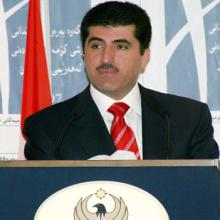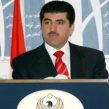Turkey’s Choice with Barzani: The Gun or the Olive Branch
Publication: Terrorism Focus Volume: 4 Issue: 37
By:

Shortly after the Turkish National Assembly passed a resolution authorizing the Turkish army to enter northern Iraq, President Massoud Barzani of the Kurdistan Regional Government of Iraq (KRG) replied: “If they invade there will be war.” Barzani added: “We are not a threat to Turkey and I do not accept the language of threatening and blackmailing from the government of Turkey” (The Independent, October 29). Barzani was also unwilling to contemplate a Turkish demand that he send his own KRG troops to fight PKK militants operating out of the extremely mountainous terrain of northeastern Iraq, insisting that his “main mission would be not to allow a Kurdish-Kurdish fight to happen within the Kurdish liberation movement.” President Barzani’s statements, and particularly his implicit reference to the PKK as part of “the Kurdish liberation movement,” inflamed Turkish nationalist sentiment, but played well amongst Iraqi Kurds. Barzani also provoked fury in Turkey in April, when he stated that if Turkey has the right to involve itself in the Kirkuk issue, Iraqi Kurds have the right to involve themselves in Diyarbakir, the largest predominantly Kurdish city in Turkey (Hurriyet, April 8). Turkish media reacts quickly to any such statements, and Barzani’s name regularly makes the front page of mass circulation Turkish newspapers, although never preceded with honorific titles such as “Mr.” or “President.”
Since Barzani became president of the KRG and his fellow Kurd and erstwhile rival Jalal Talabani became president of Iraq, the former made public statements that have tended to be more confrontational towards Turkey, while the latter appears to have pursued a more diplomatic discourse with Ankara. Part of the explanation for this difference may come from the fact that KRG President Barzani views his role as catering more to the sensibilities of his Iraqi Kurdish constituents, while Iraqi President Talabani tries to represent all of Iraq. Another part of the explanation may be more personal, however: As President of Iraq, Jalal Talabani receives full Turkish recognition and all the respect due a head of state. In contrast, Turkish media and government officials have consistently snubbed Massoud Barzani, refusing to refer to him as “President,” unwilling to accord him diplomatic honors or dialogue with high Turkish officials, and apparently reluctant to even say “Kurdistan Regional Government.” In an interview with the Turkish newspaper Milliyet on October 30, after insisting that he was a friend of Turkey and desired good relations, Barzani asked: “You [Turkey] do not talk to me in an official capacity. You do not accept me as a partner for talks. You do not maintain a dialogue with me. Then suddenly you want me to take action for you against the PKK? Is this a way to do things?”
Governments may conduct politics and diplomacy, but governments are made up of people, and people want recognition and respect from one another. So while Iraqi Kurdish leaders such as Jalal Talabani, Hoshyar Zebari (Iraq’s foreign minister), Barham Salih (Iraq’s deputy prime minister) and Nechirvan Barzani (the KRG’s prime minister) try to smooth over disputes with Ankara, President Barzani may increasingly see himself as the repository of Iraqi Kurdish pride and dignity in the face of Turkish bullying.
In the October 30 interview with Milliyet, Barzani went on to question whether or not a Turkish military incursion into Iraq would really be aimed at the PKK, given that many such incursions failed in the 1990s. He suggested that perhaps Turkey was more interested in targeting Iraqi Kurdistan as a whole, despite the region’s desire for friendly relations with Turkey. If the Turkish government is indeed intent on targeting Kurdish autonomy in Iraq, then Barzani may reason that nothing will dissuade it, and there is no point in submitting to Ankara or taking the difficult steps needed to contain the PKK militants based in his region. Asked about what would happen if Turkey enacted an embargo on Iraqi Kurdistan, Barzani replied: “We would not starve” (The Independent, October 29).
Nonetheless, President Barzani is well aware of land-locked Iraqi Kurdistan’s dependence on Turkey for trade, investment (80% of which comes from Turkey) and an outlet to the world. The KRG’s peshmerga militias are no match for the second largest army in NATO, although together with the PKK they could certainly wage a mountain-based guerrilla war and exact a very heavy toll on Turkish forces. Barzani wishes to avoid a conflict with Turkey, although not at any price. He has ordered stricter measures to deny PKK militants freedom of movement and ease of supply in Iraqi Kurdistan. His prime minister and nephew, Nechirvan Barzani, published an op-ed in the November 5 issue of the Washington Post calling for peaceful relations and cooperation between Turkey and the KRG, insisting that the PKK is friend to neither.
Either a military confrontation or an economic embargo would cost Turkey dearly. Turkey’s military knows that it cannot completely dislodge the PKK from the extremely rugged mountains near the border, and an embargo on the KRG would impact Turkey’s economically depressed and volatile Kurdish southeast almost as negatively as it would Iraqi Kurdistan. Turkish companies are also doing brisk business in Iraqi Kurdistan. Such considerations are leading prominent voices in Turkey to begin suggesting that Ankara change its approach and embrace Iraqi Kurdistan. Deniz Baykal, leader of Turkey’s main opposition Republican People’s Party (CHP), recently stated that Turkey should strengthen its trade and friendly relations with northern Iraq as part of a more sustainable way of reducing terrorism in the long-term (Hurriyet, November 10). Influential Turkish columnist Mehmet Ali Birand likewise advocates a new approach towards KRG President Barzani: “Massoud Barzani eats at the White House with President Bush. Then he goes to the European Parliament and has lunch with the representatives. He even tours Europe and makes friends with leaders. What does he find when goes back home? Turkey calls him a tribal chieftain. He is refused admittance. He’s treated as a nobody. This is the attitude that upsets Massoud Barzani most and goads him into protecting the PKK” (Turkish Daily News, November 10).
Should Turkey’s political and military leadership recognize Iraqi Kurdish autonomy and begin treating KRG leaders with the same level of respect they accord to Turkish Cypriot leaders, the new approach might go a long way towards reassuring Iraqi Kurds and fostering the kind of relationship necessary for cooperation against PKK incursions.




